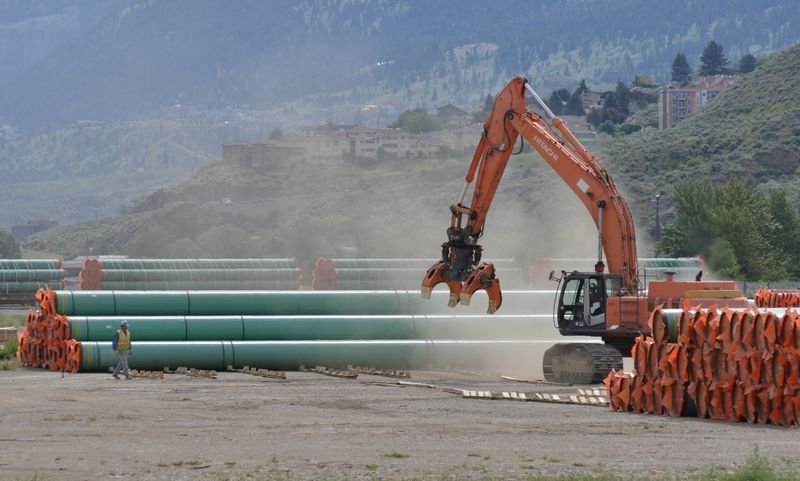By Rod Nickel and Steve Scherer
WINNIPEG/OTTAWA (Reuters) - The expansion of Canada's government-owned Trans Mountain pipeline assumes greater importance for the oil sector after the cancellation of rival Keystone XL reduced future options to carry crude, potential buyers say.
Trans Mountain Corp, a government corporation, is spending C$12.6 billion ($9.9 billion) to nearly triple capacity to 890,000 barrels per day (bpd), a 14% increase from current total Canadian capacity.
Prime Minister Justin Trudeau's government bought the 68-year-old pipeline in 2018 when previous owner Kinder Morgan (NYSE:KMI) faced legal hurdles to expand the 1,150-kilometre (715-mile) line running from Alberta to the British Columbia coast. Ottawa has always said it would find new owners.
This week, U.S. President Joe Biden revoked the presidential permit for TC Energy (NYSE:TRP)'s Keystone XL pipeline (KXL), undoing efforts by former President Donald Trump to build the line that would have supplied U.S. refiners with 830,000 bpd of Canadian oil.
That decision has made the case for completing Trans Mountain's expansion stronger.
"This pipeline is even more valuable now," said Joe Dion, chief executive of Western Indigenous Pipeline Group, one of several First Nations groups interested in buying Trans Mountain.
"Everybody thought Trudeau wasn't going to get things done in Canada, and he's the one who successfully got a pipeline over Trump."
Trans Mountain takes on more strategic importance with KXL cancelled, but it does not mean his group would pay more for it, Dion said.
Trans Mountain has completed 22% of the expansion project, called TMX, which is scheduled for service in December 2022. Suncor Energy (NYSE:SU) Inc, Canadian Natural (NYSE:CNQ) Resources Ltd and BP (NYSE:BP) PLC are among the committed shippers who have secured 80% of its additional capacity long-term.
"All eyes are on TMX," said Delbert Wapass, executive chair of Project Reconciliation, a First Nations coalition that hopes to buy 51% this year.
Sharing Trans Mountain's profits would help improve living conditions on First Nations, he said.
Canadian companies have long struggled to secure top price for their crude as pipeline congestion forced them to sell at a discount.
However reduced fuel demand due to pandemic travel lockdowns and advancing pipeline expansions have eased the flow. Even without KXL, Canada may have surplus export pipeline capacity once TMX enters service, said Matt Taylor, director of infrastructure research at investment bank Tudor Pickering Holt, who expects modest oil production growth to 2025.
Ottawa plans to sell the pipeline once there are fewer risks to completion and consultations wrap up with First Nations, said Finance Ministry spokeswoman Katherine Cuplinskas. TMX has faced stiff opposition over spill concerns.
A second government source said it bought Trans Mountain for its strategic importance, as its Pacific Ocean connection enables shippers to move oil to Asia, as well as the United States, which buys most Canadian crude.
Now its importance is even greater, the source said.
Enbridge (NYSE:ENB) Inc, which runs North America's Mainline oil network, also stands to gain from KXL's demise. It intends to sell long-term contracts for most of the Mainline's capacity, pending regulator approval, rather than continue to ration it on the spot market.
KXL's cancellation frees up long-term commitments by shippers who may now sign Mainline contracts, Taylor said.

($1 = 1.2710 Canadian dollars)
